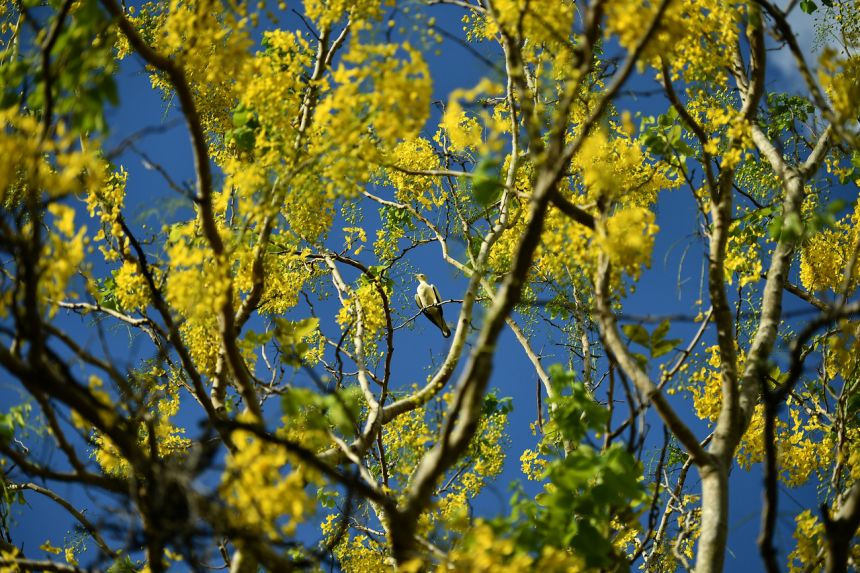
Singapore is in a unique position to explore biodiversity medicine, with more than 4,000 local flora species and cultivars, said Deputy Prime Minister Heng Swee Keat.ST PHOTO: LIM YAOHUI
SINGAPORE - A new research institute was launched here on Friday (Sept 17) to drive advancements in the biological, health and pharmacological sciences through the study of plants and natural ecosystems.
The SingHealth Duke-NUS Institute of Biodiversity Medicine (BD-Med) will study various aspects of local and regional plant biodiversity to identify any potential for novel medicinal and scientific applications.
For example, studies could look into identifying plant compounds to accelerate drug discovery, or manipulating a plant's biology to enhance its nutritional quality, said Professor Ivy Ng, who is group chief executive of SingHealth.
The institute was launched by Deputy Prime Minister Heng Swee Keat at the SingHealth Duke-NUS Scientific Congress 2021, a two-day virtual event on the theme of revolutionising medicine.
"In Singapore, we are in a unique position to explore biodiversity medicine. Our biodiversity is rich, with over 4,000 local flora species and cultivars," Mr Heng said.
"We also have a long history of imbuing the city with nature. We have carefully nurtured a biophilic city in a garden."
BD-Med will focus on three specific research programmes, backed by partnerships with local and regional scientific, innovation and environmental agencies.
The Herbal Biodiversity and Medicine programme will use new technologies to extract and study plant components that may have the potential to fight common diseases such as diabetes and hypertension.
The Food Biodiversity and Nutrition programme will look into the concept of food as medicine, or the approach of using food to manage diseases alongside conventional medical treatment. It will also study nutrient-dense and sustainable food alternatives to boost food supply and security.
The Urban Biodiversity and Wellness programme will study the effects of biodiversity on the living environment as well as its ability to promote wellness, including mental health. It will examine how a plant's biology, appearance, colour and smell affect a person's health, such as in the use of essential oils to treat anxiety and insomnia.
Professor Teh Bin Tean, who is vice-chair of research for the Oncology Academic Clinical Programme at the SingHealth Duke-NUS Academic Medical Centre, will serve as the new institute's director.
He said: "Tapping the wealth of biodiversity in South-east Asia and Singapore, my team and I hope to delve deep into studying the genetic make-up, nutritional and medicinal benefits of local and regional plants to better understand, prevent and fight diseases, and even contribute to environmental and food sustainability."
BD-Med's work will also include developing about 12,000 sq m of garden space spread across four hospitals under the SingHealth cluster - Singapore General Hospital, KK Women's and Children's Hospital, Changi General Hospital and Sengkang General Hospital - to grow and study various regional plant species.
These spaces will house herbal gardens and aquaponic systems, and will double as green spaces that can bring respite to patients and staff.
To commemorate the launch, scientists from BD-Med and the Agency for Science, Technology and Research's Genome Institute of Singapore jointly announced that they had successfully sequenced the genome of Singapore's national flower, the Vanda Miss Joaquim orchid.
Understanding the orchid's genetic make-up could help make the breeding of other orchid hybrids more efficient, Prof Teh said, adding that further research may also uncover potential therapeutic applications for health and wellness.
"This study shows the possibilities of harnessing the insights and knowledge from local and regional plant biodiversity studies for applications in science and medicine," he said.
At the event's opening ceremony on Friday, philanthropist Vincent Cheng, chairman of the Hong Kong-based Verdant Foundation, presented BD-Med's leaders a cheque for $5 million as a gift to support the institute's work.













 Get it on Google Play
Get it on Google Play